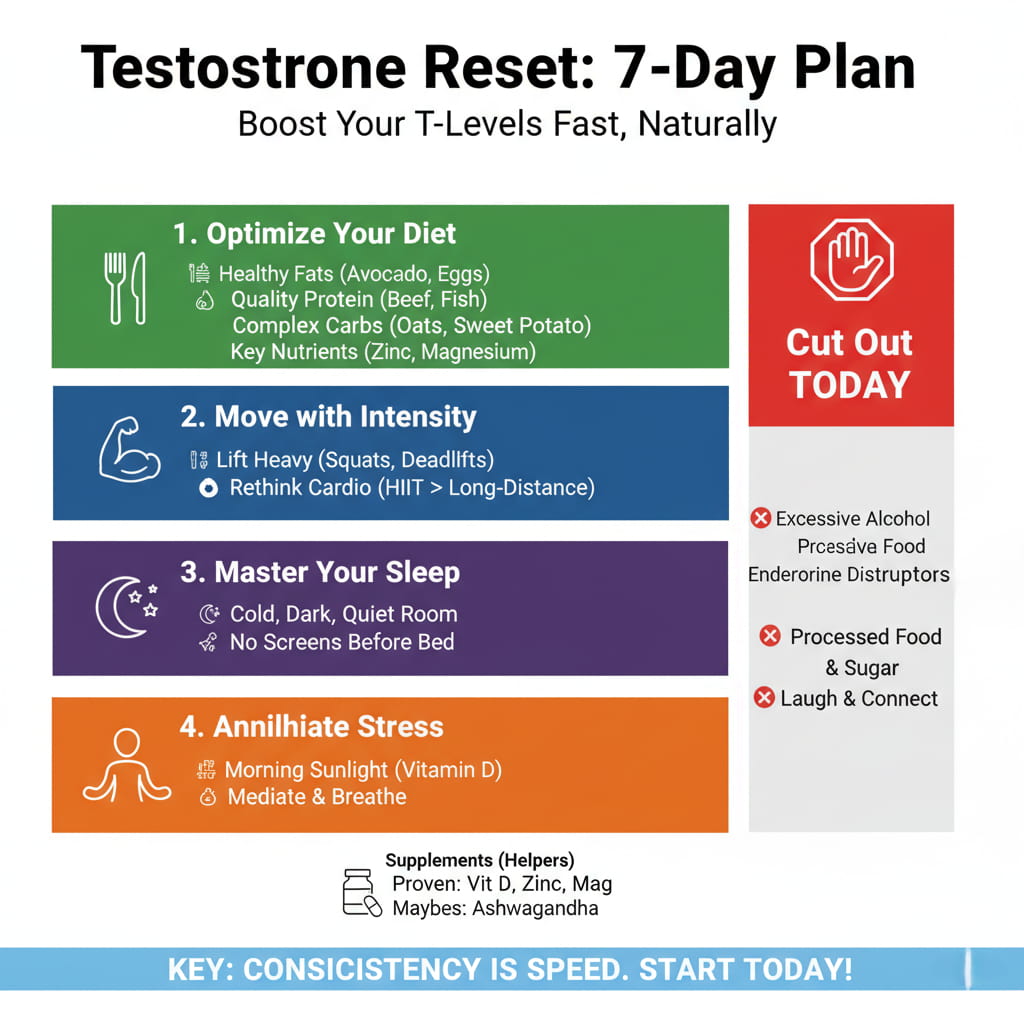Blog
How to increase testosterone levels quickly?

Feeling tired, unmotivated, and just not yourself? It’s a frustrating place to be, and you’re not alone. Many men feel this way and immediately suspect their testosterone levels are to blame, often thinking that fixing it will be a long, complicated process.
The good news is that you can reclaim your energy and drive naturally and effectively. This article provides a clear promise: you can start optimizing your hormonal health right now with targeted, powerful lifestyle changes.
This 7-day plan is your precise roadmap. We will guide you through the four core pillars, Diet, Exercise, Sleep, and Stress Management—showing you exactly what to do, starting today, to take back control and feel your best.
What “Quickly” Really Means for Hormones
Let’s be clear about the word “quickly.” When we’re talking about hormones, “quick” doesn’t mean you’ll double your levels by tomorrow. Hormonal pathways are a complex, slow-moving biological system, not an on/off switch. “Quickly” means making immediate, impactful lifestyle changes that begin optimizing your hormonal health right now. These changes can yield measurable results within weeks, not hours.
The “fastest” path isn’t a magic pill; it’s about identifying and fixing the biggest lifestyle drains on your testosterone today. Forget the “overnight” myths. The only real “hack” is consistency. Your body rewards consistency, and this 7-day plan is your launching pad for building that new, sustainable habit.
Pillar 1: Optimize Your Diet
Your hormones are quite literally built from the food you eat. You can’t expect a high-performance body if you fuel it with low-grade materials. This is the foundation.
Eat for Hormone Production
Testosterone is a steroid hormone, which means it’s synthesized from cholesterol. This makes healthy fats essential building blocks, as they are the raw precursor molecule.
- Healthy Fats: Add foods like avocados, whole eggs (with the yolk! The yolk contains the cholesterol and nutrients), olive oil, fatty fish like salmon, and almonds.
- Quality Protein: Lean beef, fish, and chicken support the lean muscle mass that is metabolically linked to healthy T-levels. More muscle mass boosts your resting metabolism and improves insulin sensitivity, both of which create an environment for healthy hormone levels.
- Complex Carbs: Don’t fear carbs, especially if you are active. You need them. Complex sources like oats, sweet potatoes, and quinoa provide the fuel for the intense workouts that signal T-production. Severe carb restriction can sometimes lead to a drop in T-levels, as the body perceives it as a state of stress or famine.
Key Micronutrients to Add
Two minerals are absolutely critical for testosterone production, and many people are deficient in them.
- Zinc: This mineral is essential for the T-production process, acting as a key enzyme cofactor in the synthesis pathway. Great sources include oysters (the most potent source), beef, and pumpkin seeds.
- Magnesium: Found in spinach, dark chocolate, and almonds, magnesium is linked to total testosterone and, just as importantly, better sleep quality. It helps regulate neurotransmitters like GABA that promote deep sleep. It also plays a role in freeing up “bound” testosterone, making more “free” testosterone available for your body to use.
Pillar 2: Move with Intensity
How you move matters just as much as if you move. A random, low-effort walk on the treadmill won’t cut it. Your body needs a strong signal to adapt and grow.
Lift Heavy Things
Resistance training is non-negotiable for boosting testosterone. Your body responds to the demand of lifting heavy loads by signaling for repair and growth, which involves releasing a cascade of anabolic hormones, including testosterone. Focus on large, compound movements that activate the most muscle at once, as this creates the largest neuromuscular and hormonal response.
- Squats
- Deadlifts
- Bench Press
- Overhead Press
Focus on progressive overload, meaning you gradually increase the weight, reps, or sets over time. This continuous challenge is what keeps the signal strong.
Rethink Your Cardio
That daily 10-mile run might be doing more harm than good for your T-levels. While excellent for cardiovascular health, chronic, long-distance endurance training (like marathon training) can elevate the stress hormone cortisol for long periods. Cortisol is the direct antagonist to testosterone. Instead, swap some of that long-duration cardio for High-Intensity Interval Training (HIIT) or keep your cardio sessions moderate and restorative.
Pillar 3: Master Your Sleep
This is the single most powerful, free testosterone booster you have. A significant portion of your daily testosterone is produced during your REM sleep cycles. Think of this 7-9 hour window as your body’s prime repair and production shift.
Studies have shown that even one week of sleeping 5-6 hours a night can measurably reduce testosterone levels in healthy young men. Skimping on sleep not only slashes your T-production overnight, but it also increases your cortisol levels the next day, creating a vicious double-hit that crushes your hormonal health. This is non-negotiable. For this 7-day reset, aim for 7-9 hours every single night.
Turn your bedroom into a sleep cave: make it cold, dark, and quiet. And put your phone and other screens away at least one hour before bed.
Pillar 4: Annihilate Stress
You cannot be a high-testosterone man and a high-stress man at the same time. The two are in direct biological conflict.
The Cortisol-Testosterone Seesaw
When you’re chronically stressed from work, finances, or relationships, your body pumps out the “fight or flight” hormone, cortisol. Cortisol and testosterone are on an inverse seesaw; when one is high, the other is signaled to go low. It’s a primal survival mechanism: when your body thinks it’s running from a predator, it has zero interest in long-term functions like building muscle, vitality, and reproduction (testosterone).
Fast De-Stress Tactics
You must actively manage your stress to break this cycle.
- Get 10 minutes of direct morning sunlight upon waking. This helps set your circadian rhythm (improving sleep) and is a primary way your body synthesizes Vitamin D.
- Try 5 minutes of guided meditation or simple breathwork. This can physically lower cortisol in real-time.
- Take short 15-minute walks during the workday to clear your head, detach from digital stress, and get your blood flowing.
- Laugh and spend time with friends. Positive social connection is a powerful, proven cortisol reducer.
What to Cut Out Today
Boosting T is also about what you stop doing. To see results fast, you must plug these hormonal drains immediately.
- Excessive Alcohol: This is a well-known T-killer. It directly impairs the Leydig cells in the testes that produce testosterone and can increase the conversion of testosterone to estrogen. This is especially true for beer, as the hops used to make it are highly phytoestrogenic.
- Ultra-Processed Foods & Sugar: Constant sugar spikes lead to insulin resistance and fat gain, especially around the midsection. Body fat is not just storage; it’s an active endocrine organ. It contains an enzyme called aromatase, which actively converts your precious testosterone into estrogen. More belly fat means you are literally running an “estrogen factory” on your own body.
- Endocrine Disruptors: Briefly, these are chemicals that mimic hormones. A primary culprit is BPA, found in hard plastics and the lining of cans. These chemicals can “clog” or confuse your body’s hormone receptors. As a quick rule for this week: don’t microwave food in plastic containers and drink from glass or stainless steel when possible.
The Role of Supplements: A Quick Review
First, get your diet, sleep, and exercise in order. No supplement can fix a broken lifestyle. Think of these as “helpers” to fill in the gaps, not magic pills.
- The Proven:Vitamin D (if you are deficient, which a large portion of the population is). It acts more like a hormone than a vitamin in the body and is critical for T-production. Also Zinc, and Magnesium. A ZMA supplement (Zinc, Magnesium, and B6) before bed is a simple way to cover these bases.
- The “Maybes”:Ashwagandha has strong clinical backing for reducing cortisol (remember the seesaw), which indirectly supports T-levels by helping your body adapt to stress (it’s known as an “adaptogen”). D-Aspartic Acid may offer a temporary boost for some, but the effects don’t appear to be long-lasting.
A Note on Medical Interventions (Anabolic Steroids)
This article focuses on natural, lifestyle-based methods. However, it is important to address medical interventions such as anabolic-androgenic steroids (AAS) or testosterone replacement therapy (TRT). These methods are, by definition, the most direct and “fastest” way to increase testosterone levels because they are a synthetic form of the hormone itself.
It is important to note that these drugs are typically appropriate for athletes and should be part of a regular exercise program such as professional bodybuilding, but if you are considering taking the drug in Canada, you should first consult a doctor and then visit a reputable anabolic steroid store such as oxygen anabolic.
Your 7-Day Takeaway: Consistency is Speed
The “quickest” way to increase your testosterone isn’t one single trick. It’s the immediate and consistent application of all these pillars at once. The “7-Day Plan” isn’t a magic fix that’s over in a week; it’s the start of a new, optimized protocol.
This isn’t a “bio-hack”; it’s a lifestyle optimization. The speed comes from simultaneously stopping the things that hurt you and starting the things that help you. Start today. Optimize your food, train with intensity, protect your sleep, and manage your stress. That is how you win.


